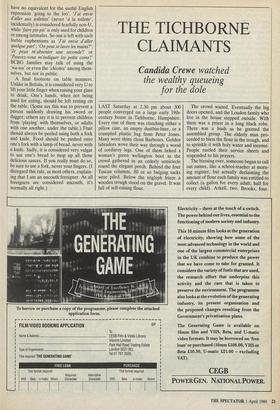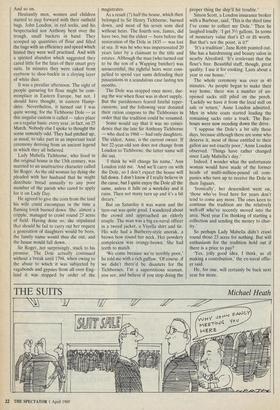THE TICHBORNE CLAIMANTS
Candida Crewe watched
the wealthy queueing for the dole
LAST Saturday at 2.30 pm about 300 people converged on a large early 19th- century house in Tichborne, Hampshire. Every one of them was clutching either a pillow case, an empty dustbin-liner, or a crumpled plastic bag from Peter Jones. Many wore shiny clean Barbours. Golden labradors wove their way through a wood of corduroy legs. One of them licked a woman's green wellington boot as the crowd gathered in an orderly semicircle round the elegant porch. Behind the four Tuscan columns, 80 or so bulging sacks were piled. Below the triglyph frieze a wooden trough stood on the gravel. It was full of self-raising flour. The crowd waited. Eventually the big doors opened, and the Loudon family who live in the house stepped outside. With them was a priest in a long black robe. There was a hush as he greeted the assembled group. The elderly man pro- ceeded to bless the flour in the trough, and to sprinkle it with holy water and incense. People rustled their service sheets and responded to his prayers.
The blessing over, someone began to call out names, like a school-teacher at morn- ing register, but actually declaiming the amount of flour each family was entitled to collect (a gallon for every adult; half for every child). Arkell, two. Brooks, four. And so on.
Hesitantly men, women and children started to step forward with their outheld bags. John Loudon, in red socks, and his bespectacled son Anthony bent over the trough, small buckets in hand. They scooped up quantities of flour and filled the bags with an efficiency and speed which hinted they were well practised. And with a spirited abandon which suggested they cared little for the fates of their smart grey suits. In minutes they were caked from eyebrow to shoe-buckle in a cloying layer of white dust.
It was a peculiar afternoon. The sight of people queueing for flour might be com- monplace in Eastern Europe, but not, I should have thought, in eastern Hamp- shire. Nevertheless, it turned out I was quite wrong, for the Tichborne Dole — as this singular custom is called — takes place on a regular basis: every year, in fact, on 25 March. Nobody else I spoke to thought the scene remotely odd. They had pitched up, as usual, to take part in an important local ceremony deriving from an ancient legend in which they all believed.
Lady Mabella Tichborne, who lived in the original house in the 13th century, was married to an unattractive character called Sir Roger. As the old woman lay dying she pleaded with her husband that he might distribute bread annually to any poor member of the parish who cared to apply for it on Lady Day.
He agreed to give the corn from the land his wife could encompass in the time a flaming torch burned down. She, almost a cripple, managed to crawl round 23 acres of field. Having done so, she stipulated that should he fail to carry out her request a generation of daughters would be born, the family name would thus die out, and the house would fall down.
Sir Roger, not surprisingly, stuck to his promise. The Dole actually continued without a break until 1794, when owing to the abuse to which it was subjected by vagabonds and gypsies from all over Eng- land it was stopped by order of the magistrates.
As a result (?) half the house, which then belonged to Sir Henry Tichborne, burned down, and most of his seven sons died without heirs. The fourth son, James, did have two, but the eldest — born before the restoration of the Dole in 1835 — was lost at sea. It was he who was impersonated 20 years later by a claimant to the title and estates. Although the man (who turned out to be the son of a Wapping butcher) was unsuccessful, the rightful heirs were com- pelled to spend vast sums defending their possessions in a scandalous case lasting ten months.
The Dole was stopped once more, dur- ing the war when flour was in short supply. But the parishioners feared fateful reper- cussions, and the following year donated their ration coupons to the Tichbornes in order that the tradition could be resumed.
Some would say that it was no coinci- dence that the late Sir Anthony Tichborne — who died in 1968 — had only daughters. The eldest, Anne, is the current owner. If her 22-year-old son does not change from Loudon to Tichborne, the latter name will die out.
'I think he will change his name,' Ann Loudon told me. 'And we'll carry on with the Dole, so I don't expect the house will fall down. I don't know if I really believe in the curse, but I quite enjoy the Dole all the same, unless it falls on a weekday and it rains. Then not many turn up and it's a bit dreary.'
But on Saturday it was warm and the turn-out was quite good. I wandered about the crowd and approached an elderly couple. The man was a big ex-naval officer in a tweed jacket, a Viyella shirt and tie. His wife had a Burberry-style anorak, a brown bow round her neck. Her powdery complexion was orangy-brown. She had teeth to match.
'We come because we're terribly poor,' he told me with a rich guffaw. 'Of course, if we didn't there'd be disasters for the Tichbornes. I'm a superstitious seaman, you see, and believe if you stop doing the proper thing the ship'11 hit trouble.'
Simon Scott, a London insurance broker with a Barbour, said, 'This is the third time I've come to collect my Dole.' Then he laughed loudly. 'I get 31/2 gallons. In terms of monetary value that's £5 or £6 worth. But that's not the point, is it?'
'It's a tradition', Jane Robb pointed out. She has a hairdressing and beauty salon in nearby Alresford. 'It's irrelevant that the flour's free. Beautiful stuff, though, great quality. I use it for cooking. Lasts about a year in our house.'
The whole ceremony was over in 40 minutes. As people began to make their way home, there was a number of un- opened sacks still piled on the porch. 'Luckily we have it from the local mill on sale or return,' Anne Loudon admitted. Men in white coats started loading the remaining sacks onto a truck. The Bar- bours were now receding down the drive.
'I suppose the Dole's a bit silly these days, because although there are some who deserve it, most of those entitled to their gallon are not exactly poor,' Anne Loudon observed. 'Things have rather changed since Lady Mabella's day.'
Indeed. I wonder what the unfortunate woman would have made of the former heads of multi-million-pound oil com- panies who turn up to receive the Dole in their Jaguars.
'Ironically', her descendent went on, 'those who've lived here for years don't tend to come any more The ones keen to continue the tradition are the relatively well-off who've recently moved into the area. Next year I'm thinking of starting a collection and sending the money to char- ity.'
So perhaps Lady Mabella didn't crawl round those 23 acres for nothing. But will enthusiasm for the tradition hold out if there is a price to pay?
'Yes, jolly good idea, I think, us 111 making a contribution,' the ex-naval offic- er said.
He, for one, will certainly be back next year for more.



















































 Previous page
Previous page